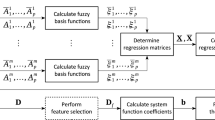Abstract
A linear matrix inequality approach to designing accurate classifier with a compact T–S(Takagi–Sugeno) fuzzy-rule is proposed, in which all the elements of the T–S fuzzy classifier design problem have been moved in parameters of a LMI optimization problem. Two-step procedure is used to effectively design the T–S fuzzy classifier with many tuning parameters: antecedent part and consequent part design. Then two LMI optimization problems are formulated in both parts and solved efficiently by using interior-point method. Iris data is used to evaluate the performance of the proposed approach. From the simulation results, the proposed approach showed superior performance over other approaches.
Preview
Unable to display preview. Download preview PDF.
Similar content being viewed by others
References
Chen, M., Kundu, A., Zhou, J.: Off-line handwritten word recognition using a hidden Markov model type stochastic network. IEEE Trans. Pattern Anal. Mach. Intel. 16, 481–496 (1994)
Cohen, E.: Computational theory for interpreting handwritten text in constrained domains. Artif. Intell. 67, 1–31 (1994)
Partizeau, M., Plamondon, R.: A fuzzy-syntactic approach to allograph modeling for cursive script recognition. IEEE Trans. Pattern Anal. Mach. Intel. 17, 702–712 (1995)
Bourlard, H., Morgan, N.: Connectionist Speech Recognition-A Hybrid Approach. Kluwer Academic, Boston (1994)
Lam, K.M., Yan, H.: Locating and extracting the eye in human face images. Pattern Recog. 29, 771–779 (1996)
Schalkoff, R.: Pattern Recognition-Statistical, Structural and Neural Approaches. Wiley, New York (1992)
Jang, J.S.R.: Fuzzy controller design without domain experts. In: Proc. IEEE Int. Conf. Fuzzy Systems, San Diego, CA, March 1992, pp. 289–296 (1992)
Kumar, K., Narayanaswamy, S., Garg, S.: Solving large parameter optimization problems using a genetic algorithm with stochastic coding. In: Winter, G., Periaux, J., Galan, M., Cuesta, P. (eds.) Genetic Algorithms in Engineering and Computer Science, Wiley, New York (1995)
Ishibuchi, H., Murata, T., Turksen, I.B.: Single-objective and two-objective genetic algorithms for selecting linguistic rules for pattern classification problems. Fuzzy Sets Syst. 89, 135–150 (1997)
Wang, C.: Integrating fuzzy knowledge by genetic algorithms. Fuzzy Sets Syst. 2, 138–149 (1998)
Ishibuchi, H., Nakashima, N., Murata, T.: Performance evaluation of fuzzy classifier systems for multidimensional pattern classification problems. IEEE Trans. Syst., Man, Cybern. B 29, 601–618 (1999)
Hall, L.O., Ozyurt, I.B., Bezdek, J.C.: Clustering with genetically optimized approach. IEEE Trans. Evolut. Computing, 103–112 (1999)
Hwang, H.: Control strategy for optimal compromise between trip time and energy consumption in a high-speed railway. IEEE Trans. Syst., Man, Cybern. A. 28, 791–802 (1998)
Jagielska, I., Matthews, C., Whitfort, T.: An investigation into the application of neural networks, fuzzy logic, genetic algorithms, and rough sets to automated knowledge acquisition for classification problems. Neurocomputing 24, 37–54 (1999)
Russo, M.: FuGeNeSys.A fuzzy genetic neural system for fuzzy modeling. IEEE Trans. Fuzzy Syst. 6, 373–388 (1998)
Wang, L., Yen, J.: Extracting fuzzy rules for system modeling using a hybrid of genetic algorithms and Kalman filter. Fuzzy Sets Syst. 101, 353–362 (1999)
Setnes, M., Roubos, H.: GA-fuzzy modeling and classification: complexity and performance. IEEE Trans. Fuzzy Syst. 8, 509–522 (2000)
Wang, J.S., Lee, G.C.S.: Self-adaptive neuro-fuzzy inference system for classification application. IEEE Trans. Fuzzy Syst. 10, 790–802 (2002)
Abonyi, J., Roubos, J.A., Szeifert, F.: Data-driven generation of compact, accurate, and linguistically sound fuzzy classifiers based on a decision- tree initialization. Int. J. Approx. Reason. 32, 1–21 (2003)
Abe, S., Thawonmas, R.: A fuzzy classifier with ellipsoidal regions. IEEE Trans. Fuzzy Syst. 5, 358–368 (1997)
Shi, Y., Eberhart, R., Chen, Y.: Implementation of evolutionary fuzzy system. IEEE Trans. Fuzzy Syst. 7, 109–119 (1999)
Russo, M.: Genetic fuzzy learning. IEEE Trans. Evolut. Computat. 4, 259–273 (2000)
Ishibuchi, H., Nakashima, T., Murata, T.: Three-objective geneticbased machine learning for linguistic rule extraction. Inf. Sci. 136, 109–133 (2001)
Author information
Authors and Affiliations
Editor information
Editors and Affiliations
Rights and permissions
Copyright information
© 2005 Springer-Verlag Berlin Heidelberg
About this paper
Cite this paper
Kim, M.H., Park, J.B., Joo, Y.H., Lee, H.J. (2005). Design of T–S Fuzzy Classifier via Linear Matrix Inequality Approach. In: Wang, L., Jin, Y. (eds) Fuzzy Systems and Knowledge Discovery. FSKD 2005. Lecture Notes in Computer Science(), vol 3613. Springer, Berlin, Heidelberg. https://doi.org/10.1007/11539506_53
Download citation
DOI: https://doi.org/10.1007/11539506_53
Publisher Name: Springer, Berlin, Heidelberg
Print ISBN: 978-3-540-28312-6
Online ISBN: 978-3-540-31830-9
eBook Packages: Computer ScienceComputer Science (R0)




